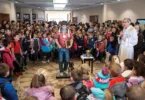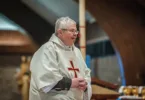by Joe Bollig
joe.bollig@theleaven.org
TOPEKA — Spring may not be here just yet, but the sun is shining a little brighter on pro-life causes this legislative session.
The reason for the metaphorical brightness could be summed up in three words: a new governor.
In sharp contrast to his predecessors, Gov. Sam Brownback has made the prolife cause part of his administration’s agenda.
“I call on the Legislature,” he said at the pro-life rally at the Capitol Jan. 21, “to bring to my desk legislation that protects the unborn, establishing a culture of life in Kansas. We must support the dignity of every human being, whether that person is unemployed, undereducated, or unborn.”
The possibilities for the 2011 legislative session, therefore, are very encouraging said Michael Schuttloffel, executive director of the Kansas Catholic Conference. The passage of pro-life legislation has long been a top goal of the conference.
“It’s a new session with a new governor, and he is very strongly pro-life,” said Schuttloffel. “This opens up a lot of opportunities that many pro-life Kansans have been waiting for for a very long time.”
Although most Kansans are pro-life to some degree, pro-life legislative efforts have always been a tough, uphill slog.
“In the past, we’ve always had to aim low, essentially because, instead of having to pass bills with a simple majority, we’ve always had to shoot for veto-proof majorities, because any prolife bill we passed was guaranteed to be vetoed,” he said.
Gov. Mark Parkinson vetoed a bill regulating late-term abortions in April 2010. His predecessor, Gov. Kathleen Sebelius, vetoed pro-life legislation in 2003, 2005, 2006 and 2008.
“That was just too high a bar to get anything passed,” said Schuttloffel. “That’s gone now. The governor will sign pro-life legislation that gets to him. All we have to do is get a simple majority, which opens up the door to strong, pro-life legislation.”
Schuttloffel is by no means complacent, however.
“The situation in the Kansas Senate is still very iffy,” he said. “The Kansas House is very strong on the life issues, so we will get pro-life legislation through the House with no problem.”
“The Kansas Senate, on the other hand, has been and will continue, we fear, to be a problem,” he continued. “There has not even been a hearing on pro-life bills in the Senate for several years. We can’t get a vote through regular orders on the Senate side, and we have to pass bills through the House and use procedural tactics to force a vote on the Senate side. It’s not clear to us that we’d even have a majority on some of the stronger pro-life bills in the Senate.”
The first important pro-life bill supported by the conference is HB 2035, the Abortion Reporting Accuracy and Parental Rights Act, which was introduced by Rep. Lance Kinzer (R-Olathe).
“It consists of, for the most part, bills that had been passed sometimes up to three times, only to be vetoed by Governor Sebelius or Governor Parkinson.”
The bill has 11 key provisions. One requires the disclosure of a specific medical diagnosis to justify a late-term abortion on a viable, unborn baby. Another provision requires parental consent, rather than just parental notification, in certain cases.
Other legislation being looked at by the conference includes funding for the Sen. Stan Clark Pregnancy Maintenance Initiative for women in crisis pregnancies, laws regarding fetal pain, and abortion clinic inspection and licensing.
“This is a largely unregulated industry in many important respects,” said Schuttloffel of the clinics. “We think it is common sense to prevent what happened in [Doctor Kermit Gosnell’s clinic in] Philadelphia from happening here. People resist [this] commonsense legislation that wouldn’t even be debated with any other medical procedure.”
Probably the most contentious issue of the 2011 session will be the state budget. Brownback wants to cut more than $700 million. In a Dec. 21, 2010, letter to the governor-elect, Schuttloffel expressed the conference’s concerns about the effect the cuts would have on the poor.
“Our concern is always that the budget not be balanced on the backs of the most vulnerable,” said Schuttloffel. “People who are unable to help themselves have become dependent on state assistance for some of their critical needs.”
There are a lot of good programs that serve good purposes, said Schuttloffel. What the conference wants is for legislators to protect the most vulnerable.
“We don’t claim to be budget experts who can tell the legislators that this program needs to be funded at this level, and that one needs to be funded at that level,” he said.
“Instead, we want to make them aware of the moral implications of their decisions, and that not all cuts are equal and all programs equally critical,” he continued. “At the end of the day, we realize the budget needs to be balanced, and different people have different ideas on how to do it. But those who are most in need must be taken care of.”
The conference also hopes that progress can be made this session in regard to repealing the death penalty. Parkinson wrote the current death penalty law in the 1990s while he was a legislator.
“We felt like we’ve made good progress on this issue,” said Schuttloffel. “Last year, the state Senate came within one vote of passing legislation that would have repealed the death penalty. We haven’t had a vote in the House on this issue recently, so I expect people will start thinking about what we can do to move the ball forward in the House.”
The conference is also interested in promoting educational choice. The bishops of Kansas believe parents should be free to send their children to schools that suit their needs and provide for greater opportunities.
“In recent years, the bishops have expressed a preference for some sort of tax-credit legislation,” Schuttloffel said, “where individuals and corporations would be able to make tax-deductable donations to scholarship organizations, which then could provide scholarships to Catholic schools.”
On Feb. 7, the Catholic bishops of Kansas met with Brownback and leaders in both houses of the Kansas Legislature. On Feb. 8, the bishops celebrated Mass for Catholic legislators, followed by a breakfast.






